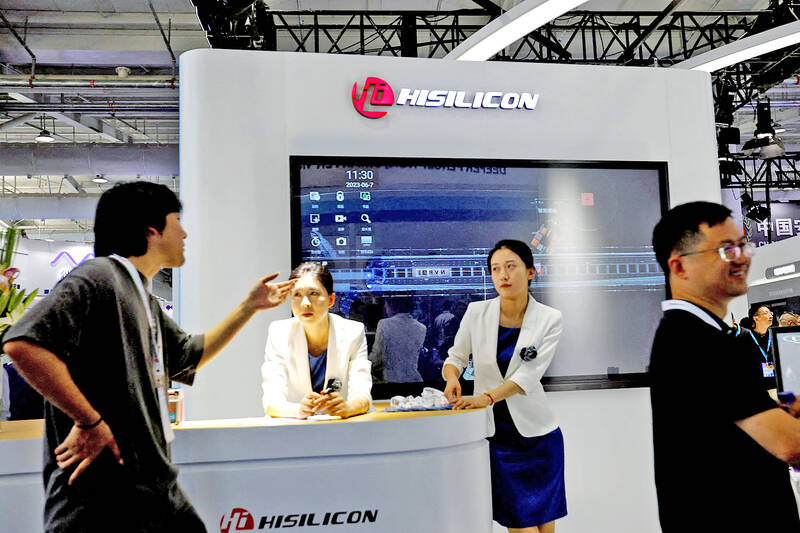A Huawei Technologies Co (華為) unit is shipping new Chinese-made chips for surveillance cameras in a fresh sign that the Chinese tech giant is finding ways around four years of US export controls, two sources briefed on the unit’s efforts said.
The shipments to surveillance camera manufacturers from the company’s chip design unit, HiSilicon Technologies Co (海思半導體), started this year, said one of the sources and a third source familiar with the industry supply chain.
One of the sources briefed on the unit said that at least some of the customers were Chinese.

Photo: Reuters
Huawei unveiled new smartphones in the past few weeks that use advanced chips, which analysts say are domestically made.
The developments indicate that the Chinese tech giant is overcoming Washington’s export controls, which since 2019 have barred it from obtaining components and technology from US firms without approval.
“These surveillance chips are relatively easy to manufacture compared to smartphone processors,” said the source familiar with the surveillance camera industry’s supply chain, adding that HiSilicon’s return would shake up the market.
A key factor is that the company appears to have worked around US restrictions on chip design software.
Huawei in March announced it had made breakthroughs in design tools for chips produced at and above 14 nanometers — two to three generations behind leading-edge technology, but an advance for the company.
HiSilicon mainly supplies chips for Huawei equipment, but has had external customers such as Dahua Technology Co (大華科技) and Hikvision Digital Technology Co (海康威視).
Before the US export controls, it was the dominant chip supplier to the surveillance camera sector, with brokerage Southwest Securities Co (西南證券) estimating its global share in 2018 at 60 percent.
By 2021, HiSilicon’s global market share plummeted to just 3.9 percent, data from consulting firm Frost & Sullivan showed.
One of the sources briefed on the unit’s efforts said that HiSilicon had shipped some low-end surveillance chips since 2019, but that its focus was on the high-end arena and reclaiming market share from the likes of Hsinchu-based Novatek Microelectronics Corp (聯詠).
The US sanctions have strangled HiSilicon’s access to electronic design automation (EDA) software from Cadence Design Systems Inc and Synopsys Inc, and Siemens AG’s Mentor Graphics.
The three firms’ products dominate the chip-design sector, which produces blueprints for chips before they are mass manufactured.
Research firm TechInsights, which examined Huawei’s Mate 60 Pro smartphone, found that it was powered by a new Kirin 9000S, an advanced chip it said was most likely made in China by China’s top chip foundry, Semiconductor Manufacturing International Corp (中芯國際).
TechInsights analyst Dan Hutcheson said that its analysis of the Mate 60 Pro and other components such as its radio frequency power chip also suggested that Huawei had access to sophisticated EDA tools that “they are not supposed to have.”
“We don’t know if they got them illicitly, or more probably the Chinese developed their own EDA tools,” Hutcheson said.
The US has no evidence that Huawei can produce smartphones with advanced chips in large volumes, US Secretary of Commerce Gina Raimondo said on Tuesday at a US House of Representatives hearing in Washington.
All three sources declined to be named, because of the sensitivity of the matter.
Huawei declined to comment.

In Italy’s storied gold-making hubs, jewelers are reworking their designs to trim gold content as they race to blunt the effect of record prices and appeal to shoppers watching their budgets. Gold prices hit a record high on Thursday, surging near US$5,600 an ounce, more than double a year ago as geopolitical concerns and jitters over trade pushed investors toward the safe-haven asset. The rally is putting undue pressure on small artisans as they face mounting demands from customers, including international brands, to produce cheaper items, from signature pieces to wedding rings, according to interviews with four independent jewelers in Italy’s main

Japanese Prime Minister Sanae Takaichi has talked up the benefits of a weaker yen in a campaign speech, adopting a tone at odds with her finance ministry, which has refused to rule out any options to counter excessive foreign exchange volatility. Takaichi later softened her stance, saying she did not have a preference for the yen’s direction. “People say the weak yen is bad right now, but for export industries, it’s a major opportunity,” Takaichi said on Saturday at a rally for Liberal Democratic Party candidate Daishiro Yamagiwa in Kanagawa Prefecture ahead of a snap election on Sunday. “Whether it’s selling food or

CONCERNS: Tech companies investing in AI businesses that purchase their products have raised questions among investors that they are artificially propping up demand Nvidia Corp chief executive officer Jensen Huang (黃仁勳) on Saturday said that the company would be participating in OpenAI’s latest funding round, describing it as potentially “the largest investment we’ve ever made.” “We will invest a great deal of money,” Huang told reporters while visiting Taipei. “I believe in OpenAI. The work that they do is incredible. They’re one of the most consequential companies of our time.” Huang did not say exactly how much Nvidia might contribute, but described the investment as “huge.” “Let Sam announce how much he’s going to raise — it’s for him to decide,” Huang said, referring to OpenAI

The global server market is expected to grow 12.8 percent annually this year, with artificial intelligence (AI) servers projected to account for 16.5 percent, driven by continued investment in AI infrastructure by major cloud service providers (CSPs), market researcher TrendForce Corp (集邦科技) said yesterday. Global AI server shipments this year are expected to increase 28 percent year-on-year to more than 2.7 million units, driven by sustained demand from CSPs and government sovereign cloud projects, TrendForce analyst Frank Kung (龔明德) told the Taipei Times. Demand for GPU-based AI servers, including Nvidia Corp’s GB and Vera Rubin rack systems, is expected to remain high,